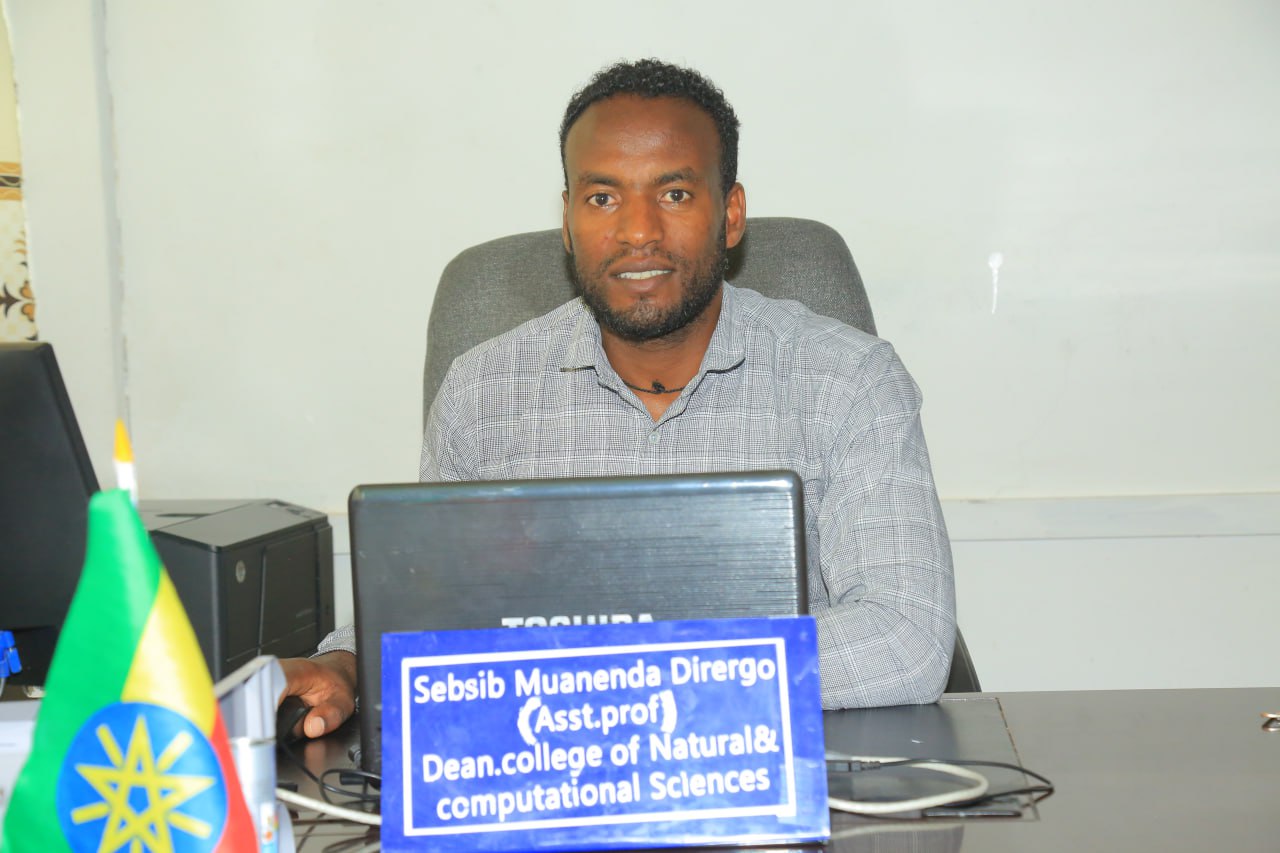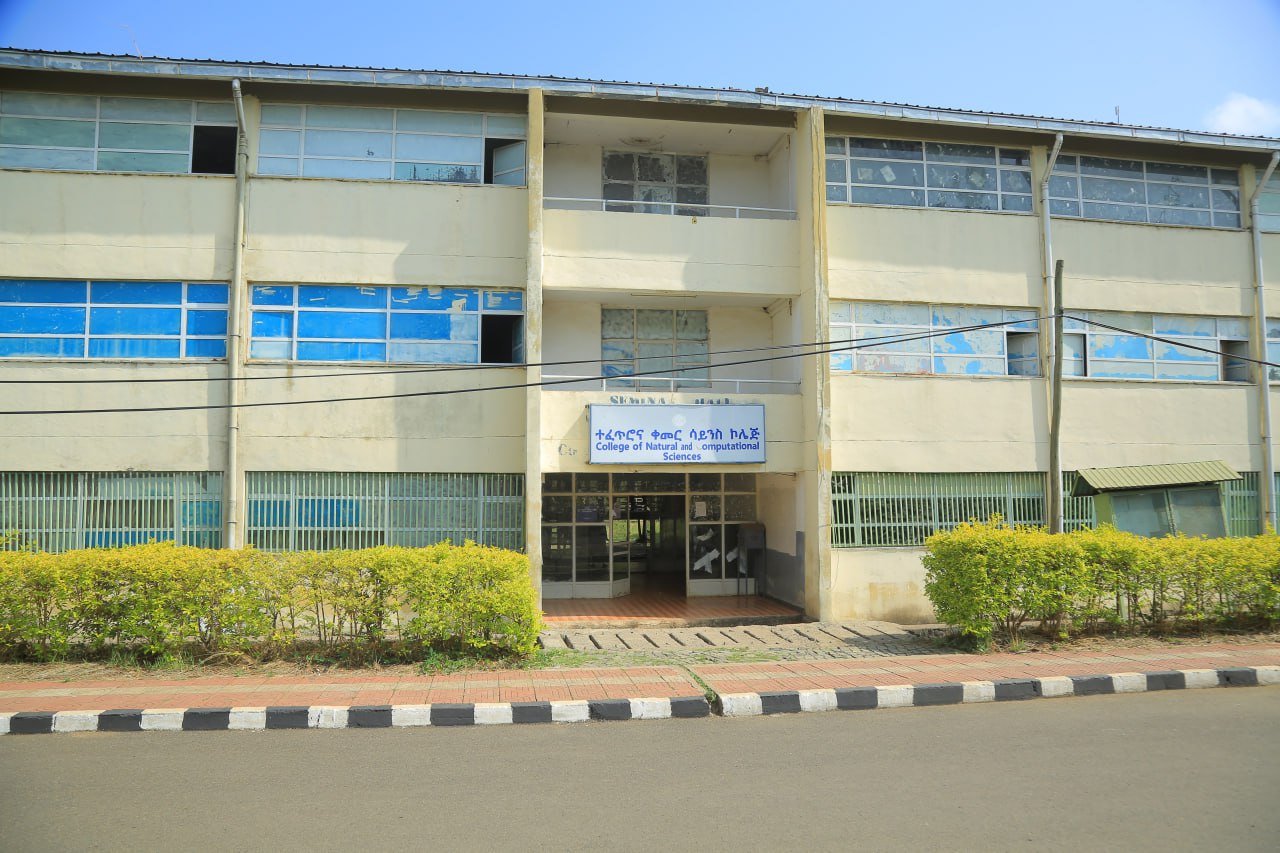
Dean of the College of Natural and Computational Sciences
Sebsib Muanenda Dirergo (Ass’t Prof.)
Contact Information:
Phone: +251913636448
Email:
Goals/Objectives
- Academic Excellence: Promote high-quality education and research in Natural and Computational Sciences.
- Faculty Development: Recruit, train, and support qualified faculty in various scientific disciplines.
- Student Success: Enhance student learning experiences, research opportunities, and career readiness.
- Research and Innovation: Support faculty and student research in Natural sciences, Computational sciences, and interdisciplinary studies.
- Curriculum Development: Ensure programs are up-to-date with scientific advancements and technological trends.
- Industry and Community Engagement: Strengthen partnerships with research institutions, industries, and government agencies.
- Infrastructure and Laboratory Development: Improve laboratory facilities, computing resources, and research equipment.
- Sustainability and Environmental Responsibility: Promote sustainable scientific practices and environmental stewardship.
- Technology Integration: Enhance the use of modern computational tools and digital learning resources.
- Global Competitiveness: Foster international collaborations, exchange programs, and knowledge-sharing initiatives.
Duties and Responsibilities
1. Academic Leadership
- Provide strategic leadership to advance scientific education and research.
- Oversee curriculum development and academic program accreditation.
- Ensure compliance with national and international educational standards.
2. Faculty and Staff Development
- Recruit, support, and retain highly qualified faculty in science and computational fields.
- Encourage faculty participation in research, professional development, and interdisciplinary collaboration.
- Establish mentorship programs to support junior faculty members.
3. Curriculum and Program Development
- Develop and update curricula based on scientific advancements and industry needs.
- Introduce new specializations and interdisciplinary programs.
- Promote STEM (Science, Technology, Engineering, and Mathematics) education.
4. Student Development and Support
- Enhance student research opportunities, internships, and career support services.
- Provide academic advising and mentorship programs for students.
- Encourage student participation in scientific conferences, competitions, and innovation hubs.
5. Research, Grants, and Funding
- Promote faculty and student research in emerging scientific and computational fields.
- Secure funding from governmental, industrial, and international sources for research projects.
- Support interdisciplinary research collaborations and technology-driven initiatives.
6. Infrastructure and Laboratory Management
- Ensure the availability of modern laboratories, research equipment, and computational resources.
- Advocate for funding to improve research and teaching facilities.
- Develop safety protocols and best practices for laboratory use.
7. Industry and Community Engagement
- Establish partnerships with research institutions, industries, and government bodies.
- Facilitate collaborative projects addressing societal and environmental challenges.
- Organize community outreach programs to promote scientific literacy and awareness.
8. Technology and Digital Learning Integration
- Encourage the adoption of advanced computing tools and digital learning platforms.
- Support the use of artificial intelligence (AI), data science, and simulation-based research.
- Promote the integration of computational techniques in various scientific disciplines.
9. Sustainability and Environmental Responsibility
- Promote research and initiatives focused on sustainability, climate change, and conservation.
- Encourage the adoption of green technology and eco-friendly scientific practices.
- Collaborate with environmental organizations for joint projects.
10. Strategic Planning and Institutional Collaboration
- Align college objectives with Wolkite University’s strategic vision.
- Participate in university governance and contribute to policy development.
- Monitor faculty and student performance using key performance indicators (KPIs).
Historical Background
The College of Natural and Computational Sciences was established in the 2012 academic year, aligning with the university's mission to advance education and research in science and technology. The college began its academic journey with 84 students across two foundational departments: Biology and Physics.
Over the years, the college has expanded its academic offerings to include additional departments such as Chemistry, Mathematics, Statistics, Biotechnology, and Sport Science. This growth reflects the college's commitment to providing a comprehensive education in natural and computational sciences.
The college offers a range of undergraduate and postgraduate programs, including Bachelor of Science (BSc) degrees in various disciplines and Master of Science (MSc) programs in fields like Mathematics, Chemistry, Biotechnology, Biology, Statistics and Physics. There is also PhD programs in Physics.
Emphasizing theoretical knowledge and practical application, the college encourages students to engage in research projects, internships, and community service. This approach aims to equip graduates with the skills necessary to contribute effectively to scientific and technological advancements in Ethiopia and beyond.
Through continuous curriculum development, faculty enhancement, and research initiatives, the College of Natural and Computational Sciences at Wolkite University strives to be a center of excellence in science education and research, addressing both national and global challenges.
The college comprises seven departments, each dedicated to academic excellence, research, and industry collaboration:
- Mathematics
- Chemistry
- Biology
- Biotechnology
- Physics
- Sport Science
- Statistics
List of post-graduate programs
- Biology (MSc in Botanical and Zoological Science)
- Biotechnology (MSc in Plant, Animal, Health, Industrial and Environmental Biotechnology)
- Chemistry (MSc in Analytical Chemistry)
- Mathematics (MSc in Algebra, Differential Equation, Optimization, Numerical Analysis and Functional Analysis)
- Statistics (MSc in Biostatistics and Applied Statistics)
- Physics (PhD in Condensed Matter Physics and Material Science)
- Physics (MSc in Condensed Matter Physics, Statistical Physics, Space Physics, Laser Spectroscopy and Quantum Optics)

